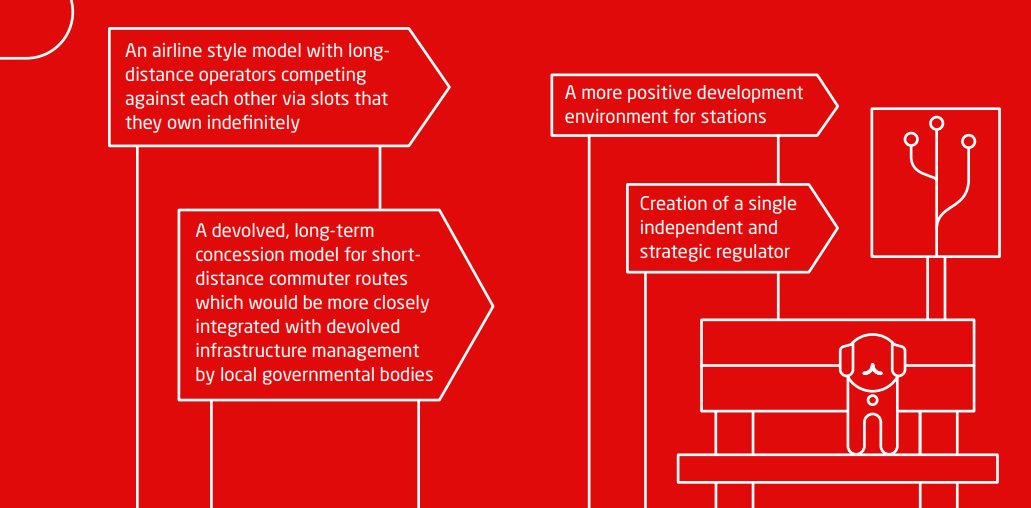The UK rail industry has already transitioned its offering and taken advantage of technology advancements to develop a wider offer with online distribution, advanced tickets, single journey options etc. But, booking a train ticket can still be a confusing exercise in the UK with open and closed, peak and off-peak, specific routing and restricted train operator offerings.
In many cases the difference between tickets can be just a couple of pounds, in others it could be hundreds of pounds. Consumers have even found that splitting one journey into multiple legs (even on the same train), can significantly reduce the cost of a journey, but can weigh you down with tickets.
It is clear that the current system is far from perfect. The biggest anomaly is that passengers booking advanced tickets on specific trains (sometimes at a hefty discount) are able to make a seat reservation, while those travelling on an open ticket (at a much higher cost) can often be forced to stand as the train is full. This is particularly true on trains operating at peak time or those taking advantage of fare incentives to travel just outside of the peak, perhaps reducing congestion at one time, but creating a new off-peak 'peak' travel period at the same time.
Virgin Trains believes a solution is to move to an 'airline model' to stop passengers having to stand and abolishing the issues of train overcrowding and complex fares. This will be based around a reservation-only system that would see passengers having to book a seat before boarding the train in order to guarantee no customers are standing on long journeys. It is also suggesting an airline-style ticketing system, with "one fare available at any given time for any given service".
The ideas was part of a series of proposals Virgin Trains contributed to the Williams Review, which was launched by the UK government in Sep-2018 to consider reforms that would provide better service and value for money on the UK's railways. The 27-page Reimagining The Railway publication says overcrowding and complex ticketing could be abolished, new competition would drive up standards and lower prices, and proposals would encourage long-term private sector investment.
Other suggestions included a devolved and longer-term franchise system for short-distance commuter routes that would be integrated with devolved infrastructure management by local governments; the creation of a single, independent and strategic regulator for the railways; and allowing operators to bid for "bundles of train services" on long-distance routes.
Virgin Trains believes these ideas will together give train operators longer-term control of their businesses and provide greater choice than at present, with increased competition helping drive the quality of customer services up and fares down.
IMAGE - Virgin Trains says the UK rail system has been a success, but with limits. However, radical reform could set it up for success for decades to come. An approach which seeks to ditch dogma and the one-size-fits-all approach could provide significant benefits to taxpayers, customers and the economy Source: Virgin Trains' Reimagining the Railway submission
Source: Virgin Trains' Reimagining the Railway submission
But, if Virgin Trains had any plans to introduce such ideas within its own operations then that will now have to be dropped. It has already pulled out of its East Coast franchise that runs trains out of London Kings Cross to Edinburgh, Leeds, Newcastle, York and up to Aberdeen and Inverness via the east of the country and seen it return to government control under the historical London North Eastern Railway (LNER) name.
Now, it has missed out on renewing its West Coast franchise that includes routes from London Euston to Birmingham, Glasgow, Liverpool and Manchester after UK transport secretary Chris Grayling made the decision to disqualify its joint venture partner Stagecoach from bidding for the contract due to a clash between industry and the Government over pensions. Virgin Trains has held the franchise since Mar-1997, but will now see it revert to Abellio from Aug-2019.
While, Virgin Trains ideas, which were submitted ahead of its disqualification from the West Coast process, will deliver on solving the issue of overcrowding that would not widely be accepted by corporate travellers. Train companies are currently obliged to accept walk-up fares, meaning they have no control over the number of people getting on a particular train unless it is deemed unsafe. For commuters and business travellers, when plans can change and flexibility is required, do not want to be penalised by being restricted to boarding a specific train.
Mick Cash, general secretary of the Rail, Maritime and Transport union, described Virgin Trains' proposal as a "de-regulated free for all" where private train operators would "slug it out on the most lucrative routes on a slot-by-slot basis". He believed the "version of the broken rail franchising model pumped on steroids" would lead to "total chaos" with passengers "trapped in a transport nightmare of escalating fares where prices rise by the minute according to availability".
The Williams Review refers to Keith Williams, a former CEO of British Airways, so he would know first-hand the airline sales and distribution model. He has said it is clear that franchising cannot continue in its current form, and that it was stifling innovation. But, for now, it remains unclear just how things will change and how the system will evolve.